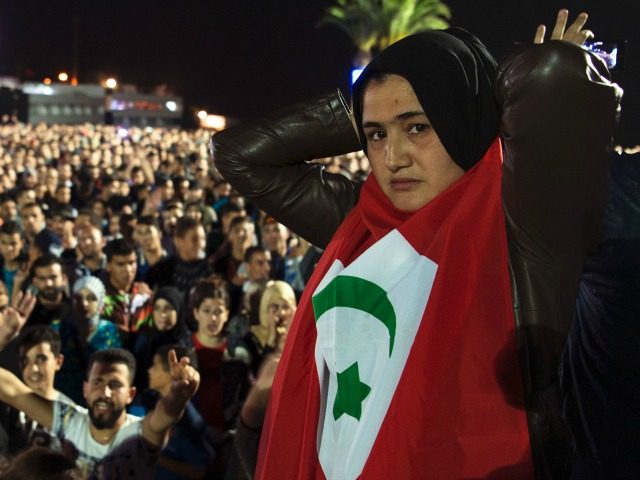(AFP) – The gruesome death of a fishmonger in Morocco last week has triggered the country’s largest protests in years, stirring memories of the death of a Tunisian vendor in 2010 which is often regarded as the spark that set the Arab Spring in motion.
Thousands of Moroccans took to the streets in a northern city on Monday protesting for the fourth day over the death on Friday of Mouhcine Fikri, who was crushed in a garbage truck after a confrontation with police who confiscated his produce.
Fikri’s death in the Rif — an ethnically Berber region long neglected under the former king and at the heart of a 2011 protest movement for reform — has triggered outrage in other cities, including the capital Rabat.
Thousands attended his funeral in Al-Hoceima on Sunday after an image of his inert body — head and arm sticking out from under the lorry’s crushing mechanism — went viral on social media.
The gruesome picture was splashed across the front page of newspapers on Monday alongside photos of the protests — in Al-Hoceima as well as in smaller Rif towns, but also in Casablanca, Marrakesh and Rabat.
“Morocco is in shock. The horrific death of the fish seller has caused tears in the Rif and outrage among Moroccans,” the daily Akhbar Alyoum said.
Large-scale protests are rare in Morocco, where the king still holds ultimate sway. Five years ago the authorities calmed Arab Spring-style protests in 2011 with reforms, spending and tougher security while leaders in Tunisia, Egypt and Libya were swept from power.
But in recent days, a frenzy of angry postings on social media and protest chants have blamed the Makhzen, a term used to describe the royal establishment.
“Protests will continue until all the responsible for that crime are punished,” said Al-Houssine Lmrabet, one of the protests organizers. “We also want guarantees that this will not happen again. This should start by cleaning the public administration of corrupted people.”
Morocco’s protests erupted at a sensitive moment as the kingdom prepares to host the 2016 United Nations climate change conference in November and the prime minister begins to form a coalition government after elections this month.
Not another Tunisia
The parallel between Fikri’s death and that of Mohamed Bouazizi in Tunisia in late 2010 has prompted speculation about the possible fallout from the latest protests in Morocco.
Bouazizi set himself on fire in desperation because police confiscated fruit and vegetables he was selling, starting the process that toppled decades-old regimes across the region.
Similarly, Fikri had fish confiscated by police on Friday after he bought it at the port. Local authorities have banned swordfish fishing and sales in this season.
According to local media and authorities, Fikri jumped inside the trash truck that police used to destroy the confiscated fish in a desperate attempt to recover it and he was caught inside the crusher.
Activists accused police officers of ordering garbage men to crush Fikri, but the Moroccan police (DGSN) denied those accusations in a statement on Sunday.
On Sunday, the Moroccan Association of Human Rights (AMDH) warned of a “possible repeat” of the 2011 protests in Morocco.
But while the scale of the protests has surprised many observers, analysts stress that Morocco is a very different country from pre-2011 Tunisia, with democratic elections and a monarch who still enjoys broad support.
In an effort to calm tensions, King Mohamed, currently on a tour of Africa, has ordered the interior minister to visit the victim’s family and present royal condolences. The government also promised an investigation.
Moroccan authorities heavily police protests, nervous over popular unrest since the 2011 protests. During those protests the king devolved some of his authority to an elected government in a constitutional reform.

COMMENTS
Please let us know if you're having issues with commenting.